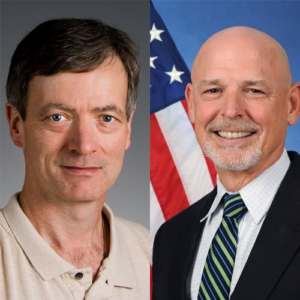
Robert C. Klesges, PhD and G. Wayne Talcott, PhD
UVA School of Medicine faculty Robert C. Klesges, PhD and G. Wayne Talcott, PhD, both professors in the Department of Public Health Sciences, and their colleague from University of Memphis, Meghan McDevitt-Murphy, PhD, were awarded a $3.2 million grant from the NIH for research to reduce the prevalence of binge drinking in the U.S. military.
Episodic heavy or binge drinking and the associated health and social consequences are substantial public health concerns, with a high prevalence among young adults. This is particularly true among U.S. military personnel. While alcohol consumption in the U.S. military is very high and normative, there is zero tolerance for getting in legal trouble while drinking, and Airmen who do get in alcohol-related legal trouble (e.g., DUI, sexual assault) typically receive what is called an Alcohol Related Incident (ARI), which leaves a permanent negative mark on their service record.
In other populations, Brief Alcohol Interventions (BAIs) for alcohol misuse have been validated as efficacious with robust evidence for mostly college young adults who report episodic heavy drinking. Many BAI studies have targeted young adults who drink hazardously; these individuals are generally not interested in abstaining from alcohol, but are often willing to decrease the amount they drink or change the manner in which they drink in order to reduce harmful consequences. Klesges and Talcott previously published the results of a BAI group-based intervention that has been shown to reduce ARIs universally, not in just high-risk drinkers, in over 150,000 Airmen on average by 16%. Since 2010, the BAI has been disseminated to most Airmen in Technical (Advanced) Training in the U.S. Note that Airmen refers to an individual regardless of gender or rank. However, it is clear that additional research is needed to enhance the efficacy of BAI intervention and to reduce the risk associated with problem drinking behavior. One strategy that could improve health promotion outcomes is well timed and tailored automated text messages. Building on their preliminary study where text messages reduced driving after drinking as well as total drinks consumed before driving, text messaging may be highly effective as the precise time that Airmen gain access to alcohol (when they are allowed off base for the first time) is known and is the same time for all Airmen.
One of the challenges to conducting alcohol research in the military is the lack of privileged communication. As a result, it is difficult to obtain valid self-reports due to a tendency to deny or minimize use. Fortunately, the researchers have recently validated a method developed by their research team for collecting anonymous data over time.
The researchers will be conducting the first study in the military, as well as the first large scale clinical trial, where intervention effects will be tracked out to a one-year follow-up. Findings would have strong implications for conducting research in both civilian and military populations. The plan is to recruit approximately 3000 Airmen to either receive the currently administered group BAI vs. the BAI+ interactive counselor facilitated text messages time timed to occur before, during, and after Airmen have access to alcohol; and to evaluate the efficacy of the intervention at a 12-month follow-up using repeated anonymous surveys with unique identifiers allowing them to match up surveys, while simultaneously maintaining anonymity.
